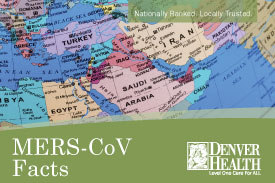 What is Middle East Respiratory Syndrome Coronavirus (MERS-CoV)?
What is Middle East Respiratory Syndrome Coronavirus (MERS-CoV)?
Middle East Respiratory Syndrome (MERS) is a viral respiratory illness caused by a coronavirus called “Middle East Respiratory Syndrome Coronavirus” (MERS-CoV). Download a MERS-CoV information sheet.
Coronaviruses are common viruses that most people get at some time in their life; they may also infect animals. They usually cause mild to moderate upper-respiratory tract illnesses.
This is a different virus than the one that caused the SARS outbreak in 2003.
What are the symptoms of MERS-CoV?
Most people infected with MERS-CoV develop severe, sudden respiratory illness with symptoms of fever, cough, and shortness of breath. Up to one-third of people infected may die from the virus.
How do you get MERS?
The virus is spread from person-to-person through close contact. Close contact is defined as:
- Any person who provided care for the patient, including a healthcare worker or family member, or had similarly close physical contact; or
- Any person who stayed at the same place (e.g. lived with, visited) as the patient while the patient was ill.
What are the risks of traveling to the Middle East?
The Centers for Disease Control and Prevention (CDC) does not recommend changing travel plans because of MERS-CoV.
- Healthcare providers traveling to work int he Arabian Peninsula should follow CDC's recommendations for infection control or confirmed or suspected cases, and monitor their own health closely.
- Travelers visiting for other reasons should wash their hands frequently and avoid contact with people who are sick.
What if I recently traveled to countries in the Arabian Peninsula or neighboring countries and got sick?
See your healthcare provider and mention your recent travel if you develop a fever and symptoms of respiratory illness, such as cough or shortness of breath, within 14 days after traveling from countries in or around the Arabian Peninsula.
- Countries in or around the Arabian Peninsula include: Bahrain, Iran, Iraq, Israel, Jordan, Kuwait, Lebanon, Palestinian territories, Oman, Qatar, Saudi Arabia, Syria, the Untied Arab Emirates (UAE), and Yemen.
- CDC does not consider traveling through an airport in the Middle East to pose a significant risk.
- Person-to-person transmission seems to require close, prolonged contact with a sick patient.
How can I help protect myself?
- Wash our hands often with sop and water for 20 seconds. Help young children do the same. If soap and water are not available, use an alcohol-based hand sanitizer.
- Cover your nose and mouth with a tissue when you cough or sneeze, then throw the tissue in the trash.
- Avoid touching your eyes, nose, and mouth with unwashed hands.
- Avoid close contact, such as kissing, sharing cups, or sharing eating utensils, with sick people.
- Clean and disinfect frequently touched surfaces, including hard surfaces and doorknobs.
- CDC says that any FDA-approved, hospital disinfectant is effective, as well as a 10% bleach solution, 70% alcohol solution (i.e. alcohol-based hand sanitizer) or a providone-iodine solutions (1% iodine).
For more information, call Denver Public Health 303-602-3614.
Sources:
- Centers for Disease Control and Prevention (CDC): Middle East Respiratory Syndrome (MERS)
- Centers for Disease Control and Prevention (CDC): Guidance for Travel
- Denver Public Health


